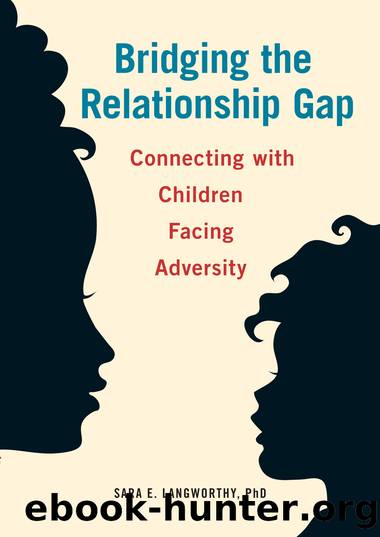Bridging the Relationship Gap by Sara E. Langworthy

Author:Sara E. Langworthy
Language: eng
Format: epub
Publisher: Redleaf Press
Published: 2015-09-03T00:00:00+00:00
Abuse
Despite some overarching similarities, there are unique differences between the experiences and outcomes of children exposed to abuse versus those exposed to neglect. Though physical and sexual abuse cases receive more nationwide attention than child neglect, they are actually less common (US Department of Health and Human Services et al. 2012). Physical abuse is the most common form of maltreatment after neglect. Physical abuse is defined differently by different states, but in general it involves an act that results in physical injury to the child. Signs that a child has been physically abused include frequent physical injuries that do not fit the explanation by parent or child, consistent tardiness or absence from the care environment, and difficulties walking or moving. Children who have been physically abused may be reluctant to share about their abuse because of fear of caregiver retribution, fear of getting the caregiver in trouble, or a belief that it is acceptable for an adult to physically harm them (NCTSN 2009).
Sexual abuse, though the least documented of maltreatment types, is still a reality for some young children. Sexual abuse includes not only physical contact but also nonphysical acts such as voyeurism. Sexual predators often use manipulation as opposed to force, sometimes through buying children gifts or arranging special activities together (NCTSN 2007). Signs that children have experienced sexual abuse include withdrawn behavior, anxiety, depression, nightmares, angry outbursts, expressing inappropriate sexual themes in play, and not wanting to be left alone with specific people. Children may not report sexual abuse because of fear of retribution, feelings of shame or guilt, or fear of not being believed (NCTSN 2007). Furthermore, very young children may not have the language skills to successfully express their experience. Though physical and sexual abuse are different experiences, in the research literature they are often treated as subtypes of abuse. For the purposes of this section, the term abuse refers to both physical and sexual abuse experiences unless otherwise noted.
During the development of important attachment relationships early in life, abuse can have detrimental effects on childrenâs learning and development. When the abuser is a parent or guardian (which is true in over 80 percent of cases of maltreatment), children lose confidence in their caregiver as a provider of safety and comfort. Researchers and practitioners often call this complex trauma because it occurs repeatedly within the context of the relationships children rely on for safety (NCTSN, n.d.-a). Children who have been abused are likely to develop insecure attachments with their caregivers. These insecure attachments, compounded by the trauma of being abused, make coping extremely difficult. This is especially true because young children are so dependent on adults around them to help them regulate their emotions and cope with stressful situations. When the caregiver is the cause and not the reliever of stress, children are left to their own devices to cope with their intense emotions.
In general, abuse leads to a high risk of physical and mental health issues later in life. Children who are victims of abuse
Download
This site does not store any files on its server. We only index and link to content provided by other sites. Please contact the content providers to delete copyright contents if any and email us, we'll remove relevant links or contents immediately.
| Administration | Assessment |
| Educational Psychology | Experimental Methods |
| History | Language Experience Approach |
| Philosophy & Social Aspects | Reform & Policy |
| Research |
The Art of Coaching Workbook by Elena Aguilar(50990)
Trainspotting by Irvine Welsh(21520)
Twilight of the Idols With the Antichrist and Ecce Homo by Friedrich Nietzsche(18504)
Fangirl by Rainbow Rowell(9098)
Periodization Training for Sports by Tudor Bompa(8171)
Change Your Questions, Change Your Life by Marilee Adams(7637)
This Is How You Lose Her by Junot Diaz(6796)
Asking the Right Questions: A Guide to Critical Thinking by M. Neil Browne & Stuart M. Keeley(5649)
Grit by Angela Duckworth(5525)
Red Sparrow by Jason Matthews(5391)
Paper Towns by Green John(5092)
Room 212 by Kate Stewart(5040)
Ken Follett - World without end by Ken Follett(4646)
Housekeeping by Marilynne Robinson(4349)
The Sports Rules Book by Human Kinetics(4296)
Double Down (Diary of a Wimpy Kid Book 11) by Jeff Kinney(4208)
Papillon (English) by Henri Charrière(4199)
The Motorcycle Diaries by Ernesto Che Guevara(4016)
Exercise Technique Manual for Resistance Training by National Strength & Conditioning Association(3957)
